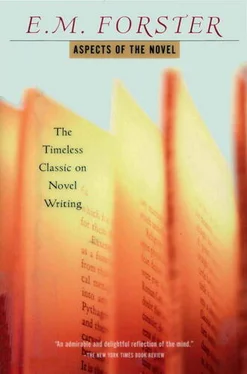Does it come off? No, not quite. Indignation in literature never quite comes off either in Juvenal or Swift or Joyce; there is something in words that is alien to its simplicity. The Night Town scene does not come off except as a superfetation of fantasies, a monstrous coupling of reminiscences. Such satisfaction as can be attained in this direction is attained, and all through the book we have similar experiments—the aim of which is to degrade all things and more particularly civilization and art, by turning them inside out and upside down. Some enthusiasts may think that Ulysses ought to be mentioned not here but later on, under the heading of prophecy, and I understand this criticism. Butprefer to mention it today with Tristram Shandy, Fleckefs Magic, Zuleika Dobson, and The Magic Flute, because the raging of Joyce, like the happier or calmer moods of the other writers, seems essentially fantastic, and lacks the note for which we shall be listening soon.
We must pursue this notion of mythology further and more circumspectly.
WITHprophecy in the narrow sense of foretelling the future we have no concern, and we have not much concern with it as an appeal for righteousness. What will interest us today—what we must respond to, for interest now becomes an inappropriate word— is an accent in the novelist's voice, an accent for which the flutes and saxophones of fantasy may have prepared us. His theme is the universe, or something universal, but he is not necessarily going to "say" anything about the universe; he proposes to sing, and the strangeness of song arising in the halls of fiction is bound to give us a shock. How will song combine with the furniture of common sense? we shall ask ourselves, and shall have to answer "not too well": the singer does not always have room for his gestures, the tables and chairs get broken, and the novel through which bardic influence has passed often has a wrecked air, like a drawing-room after an earthquake or a children's party. Readers of D. H. Lawrence will understand what I mean.
Prophecy—in our sense—is a tone of voice. It may imply any of the faiths that have haunted humanity—Christianity, Buddhism, dualism, Satanism, or the mere raising of human love and hatred to such a power that their normal receptacles no longer contain them: but what particular view of the universe is recommended—with that we are not directly concerned. It is the implication that signifies and will filter into the turns of the novelist's phrase, and in this lecture, which promises to be so vague and grandiose, we may come nearer than elsewhere to the minutiae of style. We shall have to attend to the novelist's state of mind and to the actual words he uses; we shall neglect as far as we can the problems of common sense. As far as we can: for all novels contain tables and chairs, and most readers of fiction look for them first. Before we condemn him for affectation and distortion we must realize his view-point. He is not looking at the tables and chairs at all, and that is why they are out of focus. We only see what he does not focus—not what he does—and in our blindness we laugh at him.
I have said that each aspect of the novel demands adifferent quality in the reader. Well, the prophetic aspect demands two qualities: humility and the suspension of the sense of humour. Humility is a quality for which I have only a limited admiration. In many phases of life it is a great mistake and degenerates into defensiveness or hypocrisy. But humility is in place just now. Without its help we shall not hear the voice of the prophet, and our eyes will be hold a figure of fun instead of his glory. And the sense of humour—that is out of place: that estimable adjunct of the educated man must be laid aside. Like the schoolchildren in the Bible, one cannot help laughing at a prophet—his bald head is so absurd— but one can discount the laughter and realize that it has no critical value and is merely food for bears.
Let us distinguish between the prophet and the non-prophet.
There were two novelists, who were both brought up in Christianity. They speculated and broke away, yet they neither left nor did they want to leave the Christian spirit which they interpreted as a loving spirit. They both held that sin is always punished, and punishment a purgation, and they saw this process not with the detachment of an ancient Greek or a modern Hindu, but with tears in their eyes. Pity, they felt, is the atmosphere in which morality exercises its logic, a logic which otherwise is crude and meaningless. What is the use of a sinner being punished and cured if there is not an addition in the cure, a heavenly bonus? And where does the addition come from? Not out of the machinery, but out of the atmosphere in which the process occurs, out of the love and pity which (they believed) are attributes of God.
How similar these two novelists must have been! Yet one of them was George Eliot and the other Dostoevsky.
It will be said that Dostoevsky had vision. Still, so had George Eliot. T o classify them apart—and they must be parted—is not so easy. But the difference between them will define itself at once exactly if I read two passages from their works. T o the classifier the passages will seem similar: to anyone who has an ear for song they come out of different worlds.
I will begin with a passage—fifty years ago it was a very famous passage—out of Adam Bede. Hetty is in prison, condemned to die for the murder of her illegitimate child. She will not confess, she is hard and impenitent. Dinah, the Methodist, comes to visit her and tries to touch her heart.
Dinah began to doubt whether Hetty was conscious who it was that sat beside her. But she felt the Divine presence more and more—nay, as if she herself were a part of it, and it was the Divine pity that was beating in her heart, and was willing the rescue of this helpless one. At last she was prompted to speak, and find out how far Hetty was conscious of the present.
"Hetty," she said gently, "do you know who it is that sits by your side?"
"Yes," Hetty answered slowly, "it's Dinah." Then, after a pause, she added, "But you can do nothing for me. You can't make 'em do anything. They'll hang me o' Monday—it's Friday now."
"But, Hetty, there is some one else in this cell besides me, some one close to you."
Hetty said, in a frightened whisper, "Who?"
"Some one who has been with you through all your hours of sin and trouble—who has known every thought you have had—has seen where you went, where you lay down and rose up again, and all the deeds you have tried to hide in darkness. And on Monday, when I can't follow you, when my arms can't reach you, when death has parted us, He who is with you now and knows all, will be with you then. It makes no difference—whether we live or die we are in the presence of God."
"Oh, Dinah, won't nobody do anything for me? Will they hang me for certain? . . . I wouldn't mind if they'd let me live . . . help me. . . . I can't feel anything like you . . . my heart is hard."
Dinah held the clinging hand, and all her soul went forth in her voice: ". . . Come, mighty Saviour! let the dead hear Thy voice; let the eyes of the blind be opened: let her see that God encompasses her; let her tremble at nothing but the sin that cuts her off from Him. Melt the hard heart; unseal the closed lips: make her cry with her whole soul, 'Father, I have sinned.' "
"Dinah," Hetty sobbed out, throwing her arms round Dinah's neck, "I will speak . . . I will tell . . . I won't hide it any more. I did do it, Dinah .. . I buried in the wood . . . the little baby . . . and it cried . . . I heard it cry . . . ever such a way off . . . all night . . . and I went back because it cried."
Читать дальше












